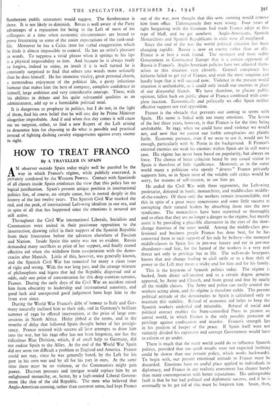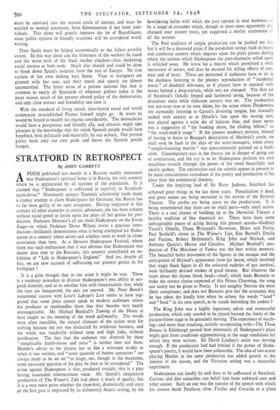HOW TO TREAT FRANCO
By A TRAVELLER IN SPAIN
AN observer outside Spain today might well be puzzled by the way in which Franco's regime, while publicly execrated, is privately condoned by the Western Powers. Contact with Spaniards of all classes inside Spain reinforces the view that this policy has no logical justification. Spain's present unique position in international politics has, of course, no simple cause, but is rooted deeply in the history of the last twelve years. The Spanish Civil War marked the end, and the peak, of international Left-wing idealism in our era, and in spite of all that has happened since the emotions it aroused are still active.
Throughout the Civil War international Liberals, Socialists and Communists were united in their passionate opposition to the insurrection, drawing relief in their support of the Spanish Republic from their frustration before the advances elsewhere of Fascism and Nazism. Inside Spain this unity was not so evident. Russia demanded many sacrifices as price of her support, and finally ceased effective aid when she withdrew from co-operation with the demo- cracies after Munich, Little of this, however, was generally known, and the Spanish Civil War has remained for many a clean issue of right and wrong. With the war long past, and the strange mixture of philosophers and bigots that led the Republic dispersed and at odds, only one point of concentration for this deep emotion remains, Franco. During the early days of the Civil War an accident raised him from obscurity to leadership and international notoriety, and good 'luck and unexpected good judgement have kept him to the front ever -since.
During the World War Franco's debt of honour to Italy and Ger- many naturally inclined him to their side, and in Germany's brilliant summer of 1940 he offered intervention, at the price of large con- cessions in North Africa. Hitler jibbed at the terms, and in the months of delay that followed Spain thought better of her precipi- tancy. Franco resisted with success all later attempts to draw him into the war, but his 1940 offer has not been forgotten, nor has the ridiculous Blue Division, which, if of small help to Germany, did not endear Spain to the Allies. At the end of the World War Spain did not seem too difficult a problem to England and America. Franco could not stay, since he was generally hated, by the Left for his part in his own war and by all for his part in ours. At the same time there must be no violence, or the Communists might gain power. Discreet pressure and intrigue would replace him by an enlightened monarchy, or, better, by a high-souled Liberal Govern- ment like that of the old Republic. The men who believed that Anglo-American cunning, rather than common sense, had kept Franco out of the war, now thought that this same cunning would remove him from office. Unfortunately they were wrong. Four years of tight bargaining with the Germans had made Franco adept at this type of bluff, and we got nowhere. Anglo-Americans, Spanish Monarchists and Spanish Republicans in exile were all outplayed.
Since the end of the war the world poliucal situation has been changing rapidly. Russia is now an enemy rather than an ally.
France is at best a weak friend. The strongest and most stable
Government in Continental Europe that is a certain opponent of Russia is Franco's. Anglo-American policies have not adjusted them-
selves to this situation very cleverly. Genteel conspiracy has hitherto failed to get rid of Franco, and even the most sanguine can hardly hope that it will succeed now. Violence in the present world
situation is unthinkable, as it could only install our enemies in place of our distasteful friends. We have therefore, to placate public opinion, fallen back on public abuse of Franco combined with com- plete inaction. Economically and politically we offer Spain neither effective support nor real opposition.
Franco is the obstacle that prevents our coming to terms with Spain. His name is linked with too many emotions. The lesson of the last three years, however, is that Franco is for the time being unshakable. In 1945, when we could have used violence we would not, and now that we cannot our feeble conspiracies are plainly futile. Economic pressure, even if we were to use it, would not be
enough, particularly with Sr. Per6n in the background. If Franco's external enemies are weak his enemies within Spain are in still worse
case. His regime has never been based on popularity, but always on force. The chorus of bitter criticism heard by any casual visitor to Spain is therefore of little significance. Moreover, as in the outer world many a politician who openly "detests" Franco privately supports him, so in Spain most of the voluble café critics would be sorry, for reasons of self-interest, to see him go.
He ended the Civil War with three opponents, the Left-wing proletariat, defeated in battle, monarchists, and middle-class middle- of-the-roaders. Of these only the workers remain irreconcilable, and this in spite of a great many concessions and some little success at corrupting their natural leaders by absorbing them into the new syndicates. The monarchists have been outwitted so thoroughly and so often that they are no longer a danger to the regime, but merely assist it by providing a plausible alternative in the eyes of the slow- change theorists of the outer world. Among the middle-class pro- fessional and business people Franco has done best, for he has converted them to tacit support of his rule by bribery—the moneyed middle-classes in Spain live in pre-war luxury and eat in pre-war abundance—and fear, for the hatred of the workers is a very real threat not only to privilege but to life. The well-to-do bourgeois knows that any change leading to civil strife or to a firm shift of power to the Left may mean a sticky end for him and for his family. This is the keystone of Spanish politics today. The regime is backed, from direct self-interest and to a certain degree genuine
approval, by Army and Church, and from greed and fear by nearly all the middle classes. The Army and police can easily control the workers acting alone, and the regime is therefore stable. The present political attitude of the democracies to Spain is calculated only to
maintain this stability. Refusal of economic aid helps to keep the Spanish workers underfed and miserable. Refusal of social and
political contact enables the State-controlled Press to picture an unreal world, in which Franco is the only possible protector of privilege against confiscation and murder. Franco's strength lies in his position of keeper of the peace. If Spain itself were not violently divided his expensive and corrupt Government would have to reform or go under.
There is much that the outer world could do to influence Spanish politics, provided that too quick results were not expected (nothing could be slower than our present policy, which works backwards). To begin with, our present emotional attitude to Franco must be discarded. Emotions have no useful place applied to individuals in diplomacy, and Franco in any realistic assessment has cleaner hands than many contemporaries with better reputations. His unforgivable fault is that he has had political and diplomatic success, and if he is eventually to be got rid of this must be forgiven him. Spain, then, must be admitted into the normal circle of nations, and must be entitled to normal courtesies, from Governments if not from indi- viduals. This alone will greatly improve the lot of Republicans, since public opinion in friendly countries will be considered worth wooing.
Then Spain must be helped economically to the fullest possible extent. In this way alone can the bitterness of the workers be eased and the worst evils of the black market checked—thus slackening social tension at both ends. Much also should and could be done to break down Spain's isolation from the rest of Europe. No iron curtain of her own making bars Spain. Visas to foreigners are granted with fair ease, and their travel and speech are almost uncontrolled. The bitter sense of a private national fate that is common to nearly all Spaniards of whatever politics today is the most vicious result of the present absurd policy of the democracies, and only close contact and friendship can cure it.
With the standard of living raised, class-hatred eased and world community re-established Franco himself might go. At worst he would be forced to modify his regime considerably. The democracies would have a prosperous and friendly ally, and altruists might take pleasure in the knowledge that the whole Spanish people would have benefited, both politically and materially, by our actions. Our present policy feeds only our own pride and leaves the Spanish people hungry.



































 Previous page
Previous page